What was I thinking? To fly to St. Maarten in the Caribbean on three days notice, somewhere I had never been before, with a one-way ticket. Then to board a 45-foot sailboat I had never seen before with four people I had n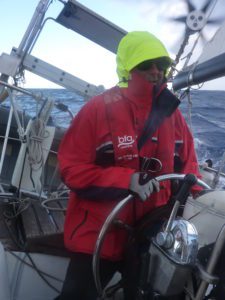 ever met before. The plan was to sail across the Atlantic Ocean, to the Azores Islands 800 miles west of Portugal, and possibly on to Finland, which of course I had never done before.
ever met before. The plan was to sail across the Atlantic Ocean, to the Azores Islands 800 miles west of Portugal, and possibly on to Finland, which of course I had never done before.
My first impressions of the town of St Maarten and the boat were the same. Crowded, cluttered, dirty, old and run down. What was I thinking? But I cast my fate with this ship and crew, trusted that everything would work out by stepping into the flow of Grace, and signed on.
For starters, we were stuck at port for over ten days with no wind. This was going to happen again. In port, we began to get acquainted. Soon I would know them all too well.
The Captain, from Finland, was a small wiry man, age 70 who has been sailing all his life. Although he had some modern, high-tech instruments on board, including a satellite phone, he didn’t know how to use them as he had locked himself into the past and refused to learn new things. Stubborn and always right, he was hard to for everyone to get along with. An obsessive-compulsive man, he over-collected stuff of all kinds and most of it was scattered around the boat. He had six of everything, including cheese cutters. And he wouldn’t throw anything away or let anyone create an organized storage system.
Marc, a French Canadian from Montreal was assigned First Mate or 2nd in command. A sailing instructor, he was hands down the best sailor on the boat. He and the Captain were to have frequent conflicts and yelling matches throughout the voyage. To me, Marc turned out to be an interesting conversationalist although prone to inappropriate emotional outbursts. Two weeks into the voyage he told me he was gay and attracted to me. This made me uncomfortable as we shared a bunk with the third male crewmember.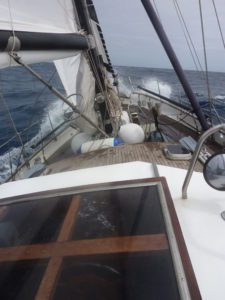
Matisse, age 20, from Denmark, had been drifting around the world for a year. A high-tech savvy whiz kid, he was able to fix a lot of electronic things on the boat. He was always playing computer games on his laptop, listening to music on his I Pod or watching movies on his computer. Only once did he share a movie with me, though I asked many times. We called him the free spirit. He had a tremendous appetite, was lazy, and the last one to help out in any situation.
Marja or Maria is Finnish and didn’t know anything about boats or cooking or English or much of anything that would be useful on this voyage. At 40, she seemed to be running away from her life, a failed marriage, and a teenaged daughter. Unfortunately she didn’t contribute much to the crew except frustration. She argued with everyone about everything in the name of women’s equality and talked incessantly. Even her cleaning skills left much to be desired. It was evident that she irritated everyone, even her countryman, the Captain.
It became apparent my first day on board, moored in the marina, that no one could cook. Two of the crew couldn’t even use a manual can opener. I stepped in. I presented the first meal of corn beef and cabbage. What!!! A traditional Irish meal. Approaching it skeptically, the crew picked at it, then devoured the whole dish. The Captain, who had been eating dehydrated legumes and raw cabbage with garlic for several weeks, assigned me the job of cook for the voyage. The next day, he asked me to provision the boat for five people for a four–week voyage. Again, something I’d never done before.
Taking a share of money from everyone, I went on a shopping spree, making my best guesses for food that could be prepared in the galley for breakfast, dinner, snacks, and soft drinks for 28 days. It was to prove just the right amount though I worried about it over the next month at sea, doing inventory frequently, counting out meals, watching how much everyone ate, and rationing out the remaining supplies.

We wasted time, money and emotional energy over the next eight days with calm winds in port until the Captain finally decided to set off by motor. He let a Good Friday departure pass because of a sailor’s superstition about leaving on that day, the next day, Saturday; we set off for the Azores, 2400 miles by sea.
After rounding Antigua, we were on the high seas and lurching in serious ocean swells. Soon I felt the queasiness of sea-sickness. Though I had medication, I chose not to use it, but waited for my body to adapt. It took three days of nausea and fasting, while I cooked for the others, holding back bile. Not the only one, First Mate Marc was sicker than me and for longer.
The sailing initiation was intense with four days of 25-knot winds and side seas of 20 to 25 ft waves. We took a pounding. Below deck, you bounced around the cabin like a grain of salt in a shaker. It was brutal and I finished the voyage with cuts and bruises all over my body from banging into the insides of the ship. My head, which never seemed to be able to duck low enough, took the brunt of it.
Above deck, moving around was easier but it rained for the first three days of the passage. Sometimes It rained so hard, the downpour seemed to flatten the sea. Doing watch, a two-hour shift above deck at the helm, was a soaking mess.
During my period of sea-sickness and wih the rainy weather, I wasn’t sure which was worse, above or below deck. Since the upper deck leaked, the lower deck or cabin got soaked too. I slept in a wet bunk until the sun came out and developed such a sore throat that I couldn’t swallow or talk. On the advice of a trans-Atlantic crossing how-to book I had talked my family doctor into giving me a round of antibiotics before leaving home. I took them and spent the next ten days slowly recovering. We only had one other medical emergency on board when the Captain broke a tooth toward the front of his mouth. The mate laid him on his back and Super-glued the broken piece back in. I wasn’t going to let him touch me!
The first mutiny erupted on the fifth day at sea. It almost came to blows. The whole crew of four wanted a break from the wet weather and a stop in Bermuda.. We were 50 miles from that island, so close. The Captain, with no explanation, refused to stop. Since he would have had to clear customs, we all thought he may have had legal issues with the Brits and the U.S.
During this period it was interesting the alliances and whispered communication between the crew at watch changes and from bunk to bunk, away from the Captain’s ears. Marc and I were in favor of speaking up about landing in Bermuda. Marja and Matisse were cowed and intimidated by the scowling, quick-tempered old Finn, a former boxer who was physically and emotionally capable of violence. They voted to stay the course.
I awoke one morning, hearing Marc screaming at the Captain “stop right now”. They squared off. Without thinking that I was between two sets of fists, I stepped between them and spoke with a calm voice that caused them to back away from each other. Suddenly, the wind made the decision for us by veering south, the perfect direction for an East course across the Atlantic. Bermuda slid out of view.
We must be the first boat to sail close-hauled, with sails trimmed flat and heading into the wind, most of the 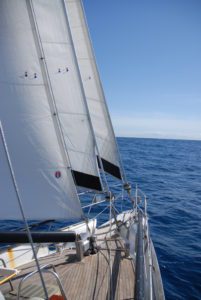 way across the Atlantic. This is the most difficult tack for both the boat and the crew because we would plough into every wave, causing it to crash over us. The boat would rise up and down, with an instant of weightlessness at the top of the swell. It was easy to imagine being washed overboard; safety harnesses were the rule. Of the 29 days at sea, we spent 19 in this close-haul position.
way across the Atlantic. This is the most difficult tack for both the boat and the crew because we would plough into every wave, causing it to crash over us. The boat would rise up and down, with an instant of weightlessness at the top of the swell. It was easy to imagine being washed overboard; safety harnesses were the rule. Of the 29 days at sea, we spent 19 in this close-haul position.
Routine set in. The Captain had divided the watch among the four of us, two hours on helm and then six hours off. We were always trying to catch up on sleep, the favorite pastime, not to mention the safest place to be on a tossing boat.
I think I got a good assignment with my watches at midnight, 8 am, and 1600 or 4 pm. A highlight of the night watch was the phosphorescent sea as the wake of the boat lit up in blue and green bubbles. Even peeing overboard created a light show!
I was the only one who had to figure cooking time into my schedule and it robbed me of some of my sleeping hours. Though I never washed dishes, I always took time to clean the galley to my standards since no one would take the trouble.
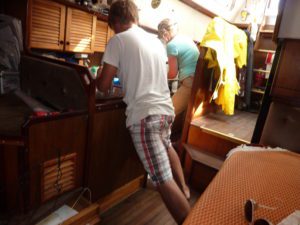 For me, cooking was easy. I had canned meat or fish, dehydrated soup and starches of egg noodles, potatoes or rice. I made as many one-pot meals as I could think of with these ingredients. I achieved a good variety and the Captain complimented me by saying this was the first trip where his crew gained weight in a trans-Atlantic crossing.
For me, cooking was easy. I had canned meat or fish, dehydrated soup and starches of egg noodles, potatoes or rice. I made as many one-pot meals as I could think of with these ingredients. I achieved a good variety and the Captain complimented me by saying this was the first trip where his crew gained weight in a trans-Atlantic crossing.
I only made two meals a day: a breakfast of porridge or pancakes and a 3 pm dinner before my watch. Except for sleeping, meals were the highlight of the day and everyone eagerly discussed the last night’s meal in detail and verbally anticipated the coming supper.
The rest of the time was spent reading, writing, contemplating, sleeping and more sleeping. I found time to play guitar when the sea was reasonably calm but was unable to practice yoga due to lack of space, the rolling of the boat, and general laziness from being so cooped up below, or harnessed and stumbling over sails and lines on deck.
Though we carried five sails, we didn’t go very fast due to the weight of the steel hulled boat. Every three to five days, we’d see another sail boat in our class, always a fiber-glass boat, flying by us. We must have been the oldest boat on the ocean. We also saw ocean-going tankers occasionally. Even they seemed to go faster.
Personal hygiene was an issue due to the rationing of water (we did not have desalination capacity on board 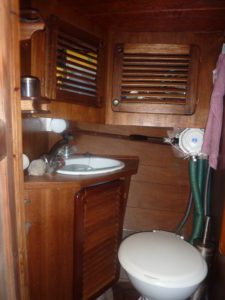 so had stocked our supply) and very poor facilities. Imagine a head the size of a porto-let, with the smell, and add the shower to that same space. Then place it on a rolling boat, shuddering under crashing waves. Not an enticing prospect for a shit or a shower. I put off both as long as possible and so did everyone else. At one point, during watch on upper deck the wind shifted and I smelled something terrible. It took a few seconds to realize it was me.
so had stocked our supply) and very poor facilities. Imagine a head the size of a porto-let, with the smell, and add the shower to that same space. Then place it on a rolling boat, shuddering under crashing waves. Not an enticing prospect for a shit or a shower. I put off both as long as possible and so did everyone else. At one point, during watch on upper deck the wind shifted and I smelled something terrible. It took a few seconds to realize it was me.
We were a crew of five who spoke five different languages. Communication was difficult and at its worse when conditions were challenging and tense and the moment was critical. Imagine trying to speak to each other in the howling wind on deck, while lowering a loudly flapping sail in driving rain.
So there we were making out way into the mid-Atlantic. Each day was the same, yet different. There were never new tasks, horizons, surroundings, or personalities. Yet we sailed in all kinds of weather and through ever-changing wave heights. A highlight of any day was a whale sighting. For my first sighting I saw a pair hung lazily hanging out at our stern. They circled around for a half hour, almost close enough to touch. We saw amazing detail on their bodies and they probably saw their first humans.
We had several more sightings. I loved watching whales jumping out of the sea as if playing. One morning on my watch, a huge humpback slowly cruised by, breaking the surface. It was as long as the boat and 20 yards away.
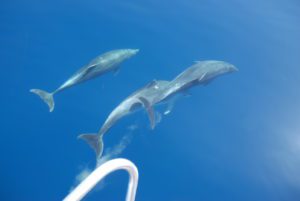 Dolphin sightings became very common. In the morning and evening, between three and 20 would circle the boat, showing off amazing swimming and jumping skills. We identified three different species. I saw one huge sea turtle swimming by the boat as if he owned the ocean.
Dolphin sightings became very common. In the morning and evening, between three and 20 would circle the boat, showing off amazing swimming and jumping skills. We identified three different species. I saw one huge sea turtle swimming by the boat as if he owned the ocean.
We had one period of exceptionally calm weather during the third week. No wind; no waves. Fortunately it was sunny. We sat on the glassy sea for three days until the Captain decided to run the motor to find wind. He was very cheap, about using fuel especially. We learned that he was broke. My guess is that the boat or his collecting bled all his money away.
By this time, routine and boredom set in. Watch duty became painful and dreaded by all, as it was difficult to stay awake and on task staring at a compass and making micro adjustments at the wheel. Our sleeping patterns were weird as one of us was in the bunk round the clock, getting an allotment of rest. Actual sailing duties were mostly limited to watch. Rarely did we even change tack or sails but when we did it was urgent because the Captain waited until the last minute to call for action. I never understood why he procrastinated like this. It’s not like we had anything else to do.
By the fourth week, relationships between crew members started to breakdown. We had a second close call with mutiny. Sailing along at a good clip, 200 miles from our destination, everyone was preparing for landfall when we were becalmed again. We had traveled over 2200 miles and were so close! For two days, the captain refused to run the motor and this caused another stand off with the mate. Using rudiment techniques of psychology, I convinced the Captain to use “ the iron sail” by making it seem like it was his idea.
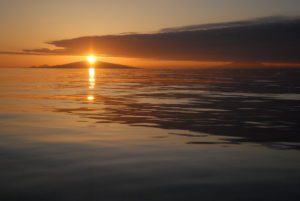 Under motor, two days later, I was the first to see it. I called out jubilantly “Land-ho!” What joy and relief to see a bump on the horizon after 28 days of an endless flat line.
Under motor, two days later, I was the first to see it. I called out jubilantly “Land-ho!” What joy and relief to see a bump on the horizon after 28 days of an endless flat line.
The whole crew was excited though the Captain stayed below, still brooding that he had given in to using the engine. Thirty-six miles from port, it happened. The engine clunked and went silent. We weren’t going anywhere, broken-down on a flat sea, for three days again. It was so frustrating to see the lights of the villages on land at night, and not be able to get there.
During daylight, the Captain worked on the engine. Incredible beauty surrounded us: strato-cumulous clouds reflected on a glassy blue sea in a multitude of rose and purple at sunrise and sunset. Still, the boat became a pressure cooker of emotion. Each of us contributed our longings for land and frustrations with each other to the pot. Finally, Marc burst in an irrational yelling argument with the Captain as they both lost control of their tempers. It was uncomfortable for all.
At last, the captain covered the engine bearings with Vaseline and was able to get it started. We moved toward land and had to change the Vaseline every 30 minutes because it burned off. No one said a word for the next three hours as we motored to port, not meeting each other’s eyes.
After a tense landing and tie up at the crowded marina, we set off to customs. As I stepped off the boat my knees gave out and I could hardly walk. I made my way down the dock like a drunken sailor with the customs agents looking at me. But the whole crew experienced the same “sea legs” as our muscles and sense of equilibrium adjusted to the phenomenon of solid land after four weeks on a pitching sea.
Three of us – Marc, Matisse and I had decided not to continue to Finland so we cleared customs and left the dock for town. The Captain and Maria, the impossible female, were going on to their homeland, so they were trapped in port for many hours of paperwork and formalities.
I felt so great to be on land and off the boat. The sights, sounds and smells overwhelmed my senses. My experience had been as limited as though I had been in a jail cell with four mates for a month. A hotel, close and easy to find, was clean and spacious. The bathroom alone was as big as the living quarters on the boat.
I took a long, hot bath, shaved my beard, called my sweetie, and settled in for a sound sleep in a real bed with clean sheets. I had learned in four weeks at sea that the whole trip was not about sailing skills or crossing the ocean. It was about endurance. Stamina and resignation sustained me through the discomfort of being wet and confined to a small space, the lack of proper hygiene, and the stress of dealing with behavior and personalities that ranged from irrational to brilliant.
What was I thinking to have set out on this trip? At age 15, I started walking marina docks and gazing at the boats, dreaming of sailing across the ocean. I guess I had been thinking about this for a long time.


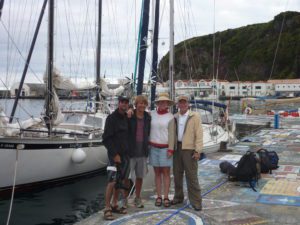
Leave A Comment